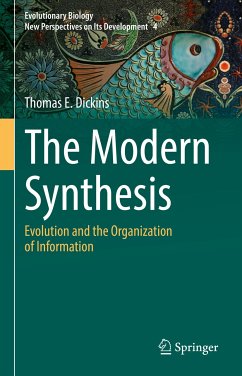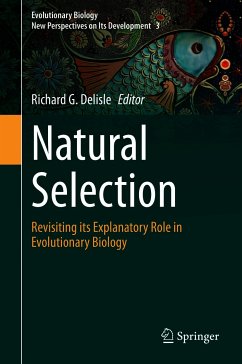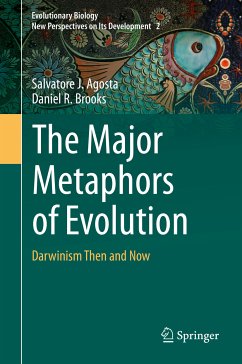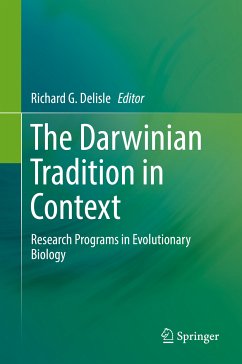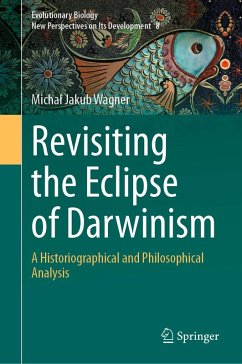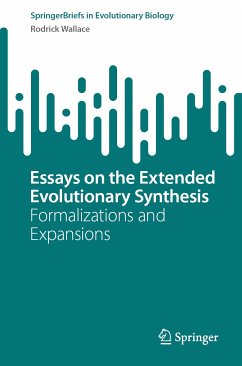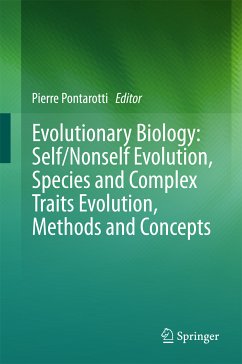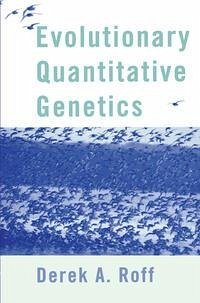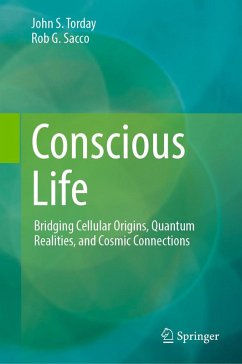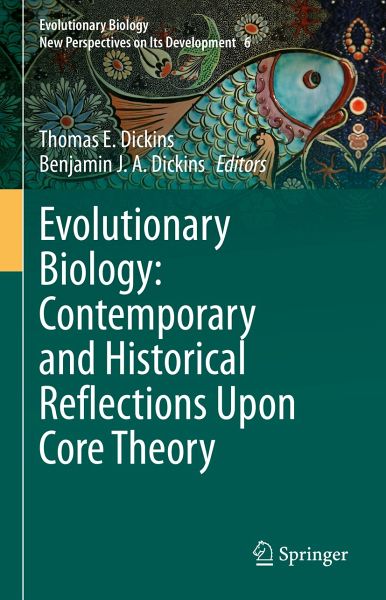
Evolutionary Biology: Contemporary and Historical Reflections Upon Core Theory (eBook, PDF)

PAYBACK Punkte
80 °P sammeln!
This book is reflecting upon core theories in evolutionary biology - in a historical as well as contemporary context. It exposes the main areas of interest for discussion, but more importantly draws together hypotheses and future research directions.The Modern Synthesis (MS), sometimes referred to as Standard Evolutionary Theory (SET), in evolutionary biology has been well documented and discussed, but was also critically scrutinized over the last decade. Researchers from diverse disciplinary backgrounds have claimed that there is a need for an extension to that theory, and have called for an ...
This book is reflecting upon core theories in evolutionary biology - in a historical as well as contemporary context. It exposes the main areas of interest for discussion, but more importantly draws together hypotheses and future research directions.
The Modern Synthesis (MS), sometimes referred to as Standard Evolutionary Theory (SET), in evolutionary biology has been well documented and discussed, but was also critically scrutinized over the last decade. Researchers from diverse disciplinary backgrounds have claimed that there is a need for an extension to that theory, and have called for an Extended Evolutionary Synthesis (EES).
The book starts with an introductory chapter that summarizes the main points of the EES claim and indicates where those points receive treatment later in the book. This introduction to the subjects can either serve as an initiation for readers new to the debate, or as a guide for those looking to pursue particular lines of enquiry.
The following chapters are organized around historical perspectives, theoretical and philosophical approaches and the use of specific biological models to inspect core ideas. Both empirical and theoretical contributions have been included. The majority of chapters are addressing various aspects of the EES position, and reflecting upon the MS. Some of the chapters take historical perspectives, analyzing various details of the MS and EES claims. Others offer theoretical and philosophical analyses of the debate, or take contemporary findings in biology and discuss those findings and their possible theoretical interpretations. All of the chapters draw upon actual biology to make their points.
This book is written by practicing biologists and behavioral biologists, historians and philosophers - many of them working in interdisciplinary fields. It is a valuable resource for historians and philosophers of biology as well as for biologists.
Chapters 8, 20, 22 and 33 are available open access under a Creative Commons Attribution 4.0 International License via link.springer.com.
The Modern Synthesis (MS), sometimes referred to as Standard Evolutionary Theory (SET), in evolutionary biology has been well documented and discussed, but was also critically scrutinized over the last decade. Researchers from diverse disciplinary backgrounds have claimed that there is a need for an extension to that theory, and have called for an Extended Evolutionary Synthesis (EES).
The book starts with an introductory chapter that summarizes the main points of the EES claim and indicates where those points receive treatment later in the book. This introduction to the subjects can either serve as an initiation for readers new to the debate, or as a guide for those looking to pursue particular lines of enquiry.
The following chapters are organized around historical perspectives, theoretical and philosophical approaches and the use of specific biological models to inspect core ideas. Both empirical and theoretical contributions have been included. The majority of chapters are addressing various aspects of the EES position, and reflecting upon the MS. Some of the chapters take historical perspectives, analyzing various details of the MS and EES claims. Others offer theoretical and philosophical analyses of the debate, or take contemporary findings in biology and discuss those findings and their possible theoretical interpretations. All of the chapters draw upon actual biology to make their points.
This book is written by practicing biologists and behavioral biologists, historians and philosophers - many of them working in interdisciplinary fields. It is a valuable resource for historians and philosophers of biology as well as for biologists.
Chapters 8, 20, 22 and 33 are available open access under a Creative Commons Attribution 4.0 International License via link.springer.com.
Dieser Download kann aus rechtlichen Gründen nur mit Rechnungsadresse in A, B, BG, CY, CZ, D, DK, EW, E, FIN, F, GR, HR, H, IRL, I, LT, L, LR, M, NL, PL, P, R, S, SLO, SK ausgeliefert werden.



